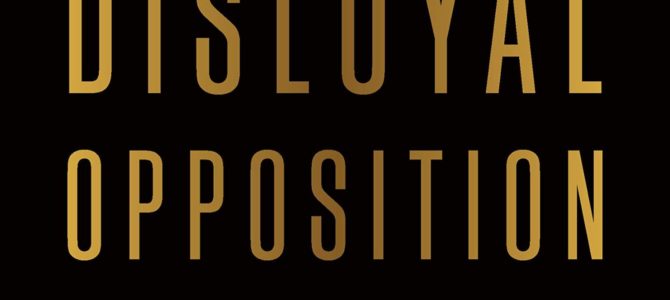
After the dust continues to settle on last year’s presidential election with Americans slowly accepting Joe Biden as the 46th president of the United States, Julie Kelly’s polemic against the Never Trump movement may seem like yet another instance of a political writer getting it wrong. When Democrats occupy the White House along with the House and Senate, it seems like those writers who opposed Donald Trump won the argument. They can point to the results and claim they knew Trump and his populism would eventually lead to losses and relegate the GOP to their current political quagmire.
But Kelly’s book Disloyal Opposition: How the #NeverTrump Right Tried—and Failed—to Take Down the President is all the more relevant because of what transpired. She was right to take this movement seriously, and her thorough review of it shows exactly why Trump lost. It wasn’t that he had issues leading, but that his party and the conservative intelligentsia had issues following.
In too many cases during his administration, the real challenges to Trump came from his own side, even as he faced a second impeachment after he left office. Kelly shows this was not another typical instance of Republicans living up to their reputation as “The Stupid Party,” but of a group of influential Republicans allowing their intellect and pride to get the best of them.
What, at first, might come off as a book by a political junkie for political junkies ends up revealing deeper truths about politics and political culture, truths that conservatives would do well to internalize. The first truth is that the GOP and conservatism has changed significantly with President Trump.
The second is that politics is far more about people than ideas. And the third and final truth: those who suffer from moral and intellectual corruption all start resembling one another.
The Tedium of Never Trump
Kelly starts her book by giving her background in politics. Her story mirrors that of many conservatives. She was influenced by her father, the typical “country club conservative,” then became involved in political campaigns as she voraciously read conservative commentary from magazines such as Weekly Standard and National Review, and eventually became a political writer herself.
Originally, she had great admiration for writers like Bill Kristol and others like him who stood up to Democrats like Bill and Hillary Clinton in the 1990s. She continued to follow him and other conservatives all through the terms of George W. Bush and Barack Obama, but then had to “break up” with them when Kristol formed the Never Trump movement.
For those who follow politics, Kelly’s story brings up many memories of what the GOP and conservatism used to be. Far from being the populist, anti-globalist movement that it is today, conservatism was dominated by neoconservatives who advocated globalism and elitism.
In the first decade of the twenty-first century, right-wing luminaries wrote endless articles on fighting terrorism, exporting democracy and free-market capitalism, and behaving decently. Like their godfather William F. Buckley, all of these writers held degrees from Ivy League universities and devoted their great learning to defending American institutions. “Establishment” was not the dirty word that it is today.
Although movements like the Tea Party sometimes broke from this thinking, the neoconservative consensus of Republican politicians and conservative intellectuals largely held all through Obama’s tenure. Hence, the GOP nominated for presidential runs those who would become the leaders of the Never Trump movement, John McCain and Mitt Romney. Both men were globalists, very much part of the establishment, and always gracious in defeat.
In past elections, National Review’s editors had no qualms about endorsing these candidates when they ran. However, as Kelly explains, National Review made a celebrated exception to Trump’s run for the presidency in their “Against Trump” special edition. Well-known conservatives took to the pages of the magazine to give their reasons for rejecting Trump—he wasn’t serious; he would wreck the party; he wasn’t really conservative, etc.
After Trump won the Republican primaries, many of these same people reluctantly threw their support behind him and over time grew to like him. Others, however, continued their crusade against Trump using Kristol’s Never Trump hashtag as their banner. It is these individuals on whom Kelly focuses her criticism.
Few might remember now, but the Never Trumpers were so desperate to unseat Trump that they tried running third-party candidates, including David French (who declined) and Evan McMullin (who went nowhere) and even went as far as supporting Hillary Clinton for president.
After supposedly making their peace with Trump’s victory in 2016, declaring that they would stay objective in their criticism, the Never Trump movement quickly forgot this and became Trump’s harshest critics. As Kelly documents, they unapologetically opposed Trump at every turn, from the Robert Mueller investigation to Trump’s first impeachment. Time and again, Kelly unearths opinions and statements Never Trumpers made against Trump. While Kelly deserves some credit for her thoroughness, it admittedly becomes a bit tedious and repetitive.
But that’s the point. The Never Trumpers were, and are, quite tedious and repetitive. Whatever principles guided them in the past were replaced by their obsession with the president. Their overwhelming pride (or insecurity?) caused them to turn against Brett Kavanaugh, Devin Nunes, and even the teenagers from Covington Catholic High School.
They cheered on McCain who, out of spite, voted against ending Obamacare, and Romney, who voted to impeach the man who had helped him win his Senate seat. As for their leftist colleagues, politics became personal for Never Trumpers and the few arguments they made were weak and largely emotional. To her credit, Kelly avoids the term “Trump Derangement Syndrome,” (TDS) but this phenomenon definitely comes to mind.
As Trump gained supporters during his presidency for his surprisingly consistent conservatism and for enduring unfair attacks from all sides, the Never Trump movement gradually disintegrated. Kelly asserts that the two great blows that ushered the decline were McCain’s death and the end of The Weekly Standard.
After this, those who identified as Never Trumpers either went on to form smaller publications like The Bulwark and Dispatch, or they continued playing the role of “court jester conservatives,” as podcaster Michael Knowles calls them, for legacy media outlets, touting their conservatism as they denounced Trump and his supporters. By the end of 2020, the leading Never Trumper, Kristol, completely shook off his conservatism and sold his soul to a leftist billionaire activist.
Nor surprisingly, the reviewer David Bahnsen at National Review took issue with Kelly’s decision to lump all the Never Trumpers together: “If you seek to put Rubin in the same category as, say, Jonah Goldberg, you’re either being lazy or dishonest.” He then goes on to defend French, whom he considers a personal target of Kelly’s “deeply personal” hatred.
This criticism would be valid if Kelly didn’t have 45 pages of endnotes to back her claims and didn’t differentiate in her analysis. Kelly is painstakingly specific in the wrong positions adopted by each and every Never Trumper mentioned in her book.
Tyrants vs. Saints
Whether it’s the sanctimonious French, the reptilian Kristol, or the unstable Jennifer Rubin, a common pattern emerges that goes beyond their opposition to Trump. Based on the evidence Kelly lays out, all of them seem to suffer from a strange solipsism that prevents self-awareness. Besides Trump being wrong all of the time, they are always right — no matter what position they take or how much reality contradicts them.
As C. S. Lewis once said, “How monotonously alike all the great tyrants and conquerors have been; how gloriously different are the saints.” The same could be said of the Never Trumpers who continued their attack against Trump even after he has left office. Either they sense an opportunity in retaking the Republican Party or they have run out of anything else to say.
In either case, Kelly is justified in completely discrediting this crowd. Even if they seemed to fail in their mission to take down the Bad Orange Man (Americans and Democrats can thank the Chinese Communist Party and their lovely virus for that), they betrayed their followers and the principles of conservatism.
They were like Brutus killing his friend Caesar, except they were far less justified and didn’t succeed. The only thing they killed was their credibility. To think that they might return to their posts of conservative thought leaders at this point is nothing short of delusional.
In other words, they were, as their favorite president would poetically put it, “losers.” Not only should American conservatives dispense with these voices and recognize them for what they are, but they should make sure they never arise again.
Kelly’s book serves as a reminder of why loyalty is such an important political virtue. When it goes, so does everything else.









